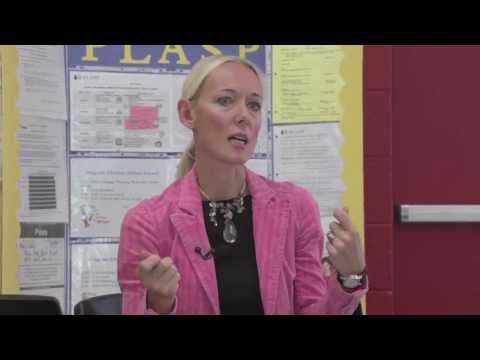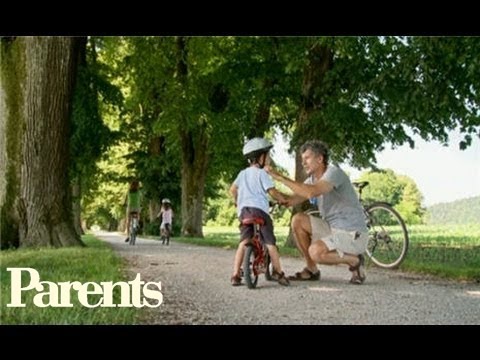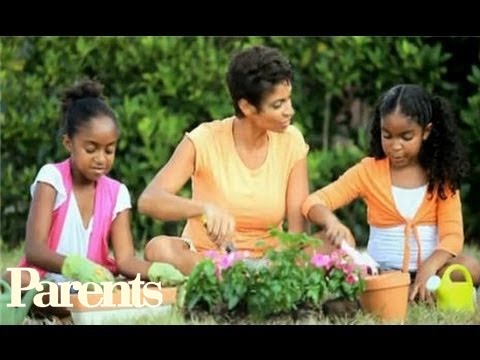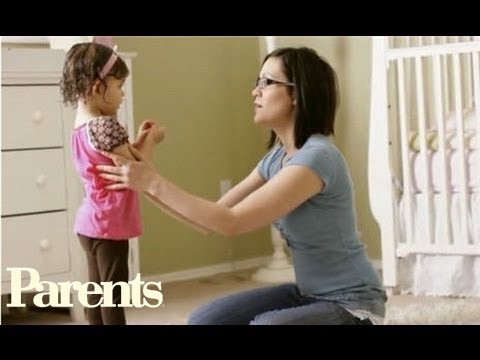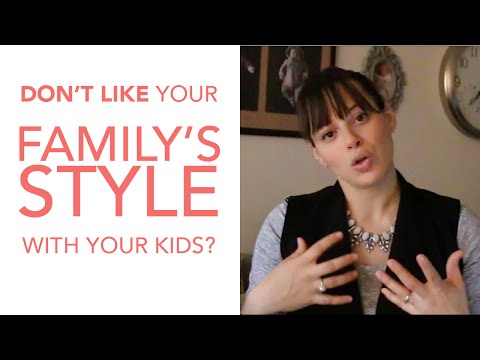
(upbeat music) – [Voiceover] The Parenting Junkie – Hi guys, welcome back to The Parenting Junkie, the place to go to love parenting and for parenting from love
Today I'm answering a bunch of different questions batched together about family members who talk to our children in ways that don't coincide with our specific parenting philosophies Notoriously mothers-in-law, grandparents, mothers and of course fathers and fathers-in-law or aunts and uncles don't necessarily share our exact same style and often it's in fact a completely opposing style that we find offensive, infuriating, frustrating, enraging And then we're faced with a question of what to do, how this affects their relationship with the child, our relationship with them, how we can change their behaviour, and control the situation So I want to offer my perspective on this And it might not be the most popular one
But, here's my take I think that it is a huge loss that we are no longer living in clans and that we no longer have a larger family or a tribe raising children together I think that so many of us are very isolated and this concept of the parent at home hours on end with two or three young children is something that lends itself very easily to extremism, depression, frustrations, resentment, contempt, confusion, a lot of things that I think that are alleviated when we're in the warm, supportive environment and hub of a larger family Now that's not to say that I don't love living in modern times and I don't appreciate the privacy and that I don't sometimes enjoy that quiet or being alone with my children I do, and I think there's everything to be grateful for about living in the 21st century
But that particular loss is sometimes felt when it comes to parenting and I think that our perception of the differences in opinions between us and our family is very much rooted in that loss because if it was an obvious thing that we're all going to live together and make it work then we wouldn't be questioning our differences, we would be embracing our diversity, hopefully I don't know, maybe that's my nostalgic interpretation but that's what I kind of think I also think that we've lost respect for elders in our community, we've lost respect for the idea that people who have had a lot more experience than us can teach us things and are incredibly valuable and wise and we think that because we all, and I definitely include myself in this, that because we read the newest books or the latest research or Google it, we know better And sometimes we do, but opening our minds to other people's points of view and opinions can be really, really valuable Now to the question at hand
I think that, yes, when someone is truly toxic or really doing things that are harmful to your child in any kind of way it is our job to protect them and I'm going to get to that in the second part of this video First I want to just address our generation or people who have young children at home now and talk about those annoyances, those things that just don't jive well with us whether it's letting a child watch TV or eat candy or speaking to a child in a patronizing way or a disrespectful way, or praising looks or punishing in some level Now, these are all things that can be really, really upsetting to us We can see them as a major, major threat to our children's upbringing And it can feel like it's going to undermine our entire parenting
But I think that sometimes we take this stuff a little bit out of proportion and we lose perspective on the things that are really important So firstly, I just want to guide ourselves back to a feeling of appreciation, a feeling of gratitude, noticing that the fact that there's someone else in our children's lives who loves them and takes interest in them is something to be grateful for It is not to be taken for granted Just the fact that our children have another family member or someone else there who cares about them is a blessing, and it should be treated as such Starting with that mindset will kind of set us up for a more peaceful and mindful approach to this relationship
History And often we can kind of develop a sense of empathy towards them to understand, well, they didn't have a different example They don't know any better, or this is their perception of how it should be or perhaps they know better than us and we have something to learn So just cultivating that compassion will also set us up for a more peaceful approach So in that frame of mind we can begin to look for ways we can learn from whoever this person is
For ways that we can actually expand and open and be flexible in our perception of what they're doing and we might even surprise ourselves first of all by learning something but second of all by realizing that maybe what they're doing is right for them or right for your child or makes sense in some other way, or that we misinterpreted the behavior to begin with The next thing I want to say is that we really need to have faith in our children's ability to stand up for themselves, to communicate for themselves Obviously this is something that they come into gradually, we're not going to throw in a baby in a dangerous situation with a caregiver who can't provide, that is not what I'm talking about But I'm talking about the nuances I'm talking about the child learning to say no, or learning to communicate that they don't want
Trusting in our children and putting stock in their preferences within the relationship is going to be very important Now I don't ever believe that we should force a child to show any kind of affection, certainly not physical affection I do believe that we should model politeness and kindness and closeness with our families and our friends but I don't believe we should ever tell a child that they have to hug someone or allow a child to be tickled when they don't want to be tickled, or that they have to sit on someone's lap or give someone a kiss or say something that they don't mean to say Generally speaking, there are exceptions to every rule But generally speaking I think that those are boundaries that we absolutely must respect
Not everyone feels that way and not everyone in our extended family is going to be sensitive to that, many people are going to be insulted if our child doesn't give them a hug or doesn't smile at them or doesn't say thank you when they leave and that is going to be a fine line that we're going to have to kind of manage and walk along And there are ways of doing that We'll talk about those ways in just a moment, but first let's have the mindset of not trying to over control and override the other relationships that our children can develop We are very important in our children's lives but we are not the only important thing Having relationships with other people and having secure attachments with grandparents or aunts and uncles is a huge asset to a child and one that we should protect and promote even at the expense of imperfection
So I just want to say that again, it is worth the cost of an imperfect relationship to gain the relationship So don't throw out the relationship with the bath water You can work to cultivate a more mindful approach towards your child and facilitate that in that relationship but controlling it or limiting it because it's not perfect is often a true loss And exposing our children to a diverse way of forming relationships and maintaining them is actually a gift that we give them They can learn through that how different people express love or express concern and that diversity will serve them well
Especially if we believe that at the root of it what happens at home and with us is going to be the biggest influence on our children's lives So now let's ask ourselves okay, and what about when we really feel that something is wrong, when someone is being unkind or too controlling or they are demanding things of our child like physical affection or a certain type of behavior or scaring them with stories or punishments that we feel is inappropriate So I think in this case it's important to develop a deep sense of trust and intuition in our own selves It is okay for us to decide that a relationship is not healthy for our child, that someone can not be trusted by themselves with our child, in fact it's our job But we need to come to a place of stillness and to connect to that intuition to really understand what is going on
Is this our projection of our relationship with that person or is this a real problem and a real threat that we feel is just too much and our child shouldn't be exposed to it The next thing we want to think about is developing a more soft and complex thought process about this, so if we've decided that a relationship is problematic, now we can ask ourselves well I don't want to throw out that relationship, right? We don't want to get into this black and white all or nothing mode, but rather develop a more complex and nuanced approach to the relationship So perhaps we can find caveats or ways to make the relationship work so our child doesn't miss out on a relationship with a significant other So maybe it's about making sure that they're never alone, that you're there, even if you're giving them space that you're there Or maybe it's about putting the activity together in a framework, a class that they can take together, a movie that they can watch together, an outing that they can do together, a project, a book, something that you can somewhat control or make suggestions or facilitate but still allow them to have the time and the connection together
This is really about believing in a person's ability to change and adapt and develop and that person is not just you and your child but also the significant other that we're trying to allow a relationship with Very important when there's a touchy relationship, when there's tension in the air that you don't go over your child's head and make them sense that tension and feel it but not understand it So things like spelling out words, you know, saying "no we can't have any C-A-K-E" in front of your child or using hand motions When your child is in the room and you're talking about them and their relationship with this grandparent, say, that can be very disconcerting and disrespectful to a child, okay? So if you can find respectful ways of speaking about it in front of the child, and involving the child in the conversation One important way of doing this is sportscasting
So sportscasting is really just about describing what you see in a somewhat objective way So if your child is very shy, for example, instead of mouthing to the adult in the room something like "he's very tired," you could actually turn to the child and say "you look so tired, don't you, is that what's "making you feel a bit shy right now?" Right, or you could offer the child would you like me to say hello for you? Involve them, this is their relationship too and it's important that they know what you're trying to say and what you're communicating about them So same goes for a child who doesn't want to give someone a hug or doesn't want to say thank you Involve the child in it You could say, "you're not ready to hug grandpa yet?" Or, "you don't feel like hugging right now, "you're not in a hugging mood? "That's okay, all of us are sometimes "not in a hugging mood
" So just normalize their behavior in front of this significant other so that they can also learn your approach and they might be open to that once it's not an attack or a criticism of them If something is absolutely unacceptable it's important to set boundaries in a clear and straightforward way And in that case you might just say it, really just kindly but firmly, something like "please don't tickle her, it looks like she's really "not enjoying that" Or "please don't pick him up because he just said no" And you could empathize with the grandparent's want and need to pick up the child while still being clear that that's not what the child wants right now
So things like, oh we don't offer sugar because it makes Eric really hyper but thank you so much anyway and you want to always be modeling gratitude, kindness, politeness, whilst still setting a firm boundary that you're confident in This goes for scheduling, I know that scheduling is a huge difficulty for a lot of families, people get upset that you can't come because your baby's sleeping or whatever Firm and kind while you empathize with their needs but also express your needs, something like "oh I wish we could come, that's Max's bedtime "so there's no chance we can make it but thank "you so much for inviting us and perhaps "another night when it's earlier we'll be able "to join" So it's very straightforward and it's very clear and you're setting a clear limit but you're also empathizing and being kind with the fact that thank you for the invitation and we do appreciate it When the relationship allows for it you can send some articles, books, links their way if that's the type of relationship you have and that can be a great way of evolving a third party giving the advice instead of it coming from you but you do have to be very careful not to come across as preachy or teachy especially to someone who has more experience and who's older that can be a really unpleasant slight so only if someone's open to it and has fun reading these things and sharing them with you
If necessary, bring your own food, or bring your own books or bring your own activities, try and find ways, creative ways of making the meet up work for you And that way you put less pressure on getting disappointed, getting frustrated with what's being on offer and you've just become part of it and you contribute to making it a good experience And now my final and most important piece of advice is model, model, model Model for the people in your children's lives, how you want them to behave So treat your child respectfully and kindly in front of them, make sure they see you handling the situation, don't keep it away from them and this is how we learn from each other just like how they can model for you
And what you're also modelling here and this is perhaps the most important thing of all, is your modelling to your child that you are able to be respectful and kind and compassionate in all settings and centered and confident with yourself and with your parenting and that you know how to treat others with kindness the way you expect your children to treat them as well Did you like this video? I really hope you did If it was helpful for you and if you think it could be helpful to anyone else I would love it if you could share it That means to world to me And I'd love to hear your tips and your approach to handling family members who have a different approach to your children than you do
The absolute best place to have this conversation is over at theparentingjunkiecom so head on over there and leave a comment now, I'd love to hear from you It would mean the world to me if you subscribed to the channel so head on over and hit the subscribe button right now Keep on loving parenting and parenting from love because your children need you almost as much as you need them Bye! – [Voiceover] The Parenting Junkie



